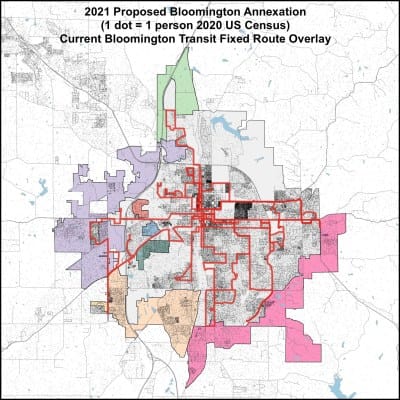City council budget hearing draws questions for Bloomington Transit on fare-free rides, geographic expansion

At Tuesday’s hearing of Bloomington Transit’s proposed 2022 budget in front of the city council, BT’s general manager, Lew May, fielded a question he’s heard many years before, including last year.

Has BT considered making the public bus service fare free?
A new question this year: How is BT thinking about providing service in the context of Bloomington’s annexation proposal?
May’s answer on the fare-free question was the same as it has been before: Yes, but that would depend on identifying a source of funding to make up the revenue shortfall.
Fares make up a relatively small percentage of BT’s revenue budget, which totals about $15 million in 2022.
But there would still be around $600,000 in annual fares to cover, that normally is paid by regular rank-and-file resident passengers.
Also potentially in the mix would be a roughly $1-million annual contribution made by Indiana University to allow faculty, students and staff to board without paying a fare.
May said he found it encouraging that when BT opted to go fare-free for over a year during the pandemic—to allow for rear-door boarding to reduce risk of transmissions between drivers and passengers—the university worked with BT to revise the agreement to reflect reduced service levels.
“That was encouraging to us,” May said. He elaborated, “[Indiana University] could have said: Well, you’re providing free fares to everyone, why not include our students? And they didn’t do that.”
May told the city council that Bloomington’s proposed annexation of about 9,000 acres of new territory and 14,000 people would mean an expansion of BT services in two ways.
First, the BT Access paratransit service would be expanded to include all of the new territory.
Second, May identified two areas where he thinks the fixed-route service should be extended. One is out 3rd Street to the Ivy Tech and Cook Medical industrial park. The other is to the southwest, in the South Rogers and Fullerton Pike area, in the vicinity of the Bachelor Heights Middle School.
The current fiscal plan for Bloomington’s annexation projects about $200,000 in additional operating expenses for the expansion of the BT Access paratransit service to the new territory. It’s also estimated that about $160,000 in capital (vehicles) would be required in the first year.
In the first year of annexation, the fiscal plan estimates additional revenue for BT at about $340,010, due to extra property tax revenues. In subsequent years, the additional footprint from the extra property tax will also add to BT’s share of local income taxes, bringing the additional revenues to around $500,000.
No estimates are included in Bloomington’s fiscal plan to cover additional fixed-route costs. In an earlier email exchange about that, May wrote to The B Square: “That is apparently an oversight by the City. I anticipate there will be additional fixed route service to a couple of areas if they’re annexed. The City is going to update their estimates and I’m told they’ll correct the transit portion when that update comes out.”
Related to the topic of annexation and where BT can provide service, on Tuesday councilmember Jim Sims drew out the fact that BT is confined by local law to service inside the city’s boundaries. Sims asked May to confirm: If there is no expansion of the city’s boundaries, there is no expansion of bus service.
May confirmed that’s the case. He pointed to the wording of the ordinance establishing Bloomington Transportation Corporation. The local law says that “[T]he boundaries of the Bloomington Public Transportation Corporation shall be coterminous with the boundaries of the city of Bloomington.”
The city council could amend the ordinance to allow for BT to extend service outside the boundaries. In February 2020, the BT board discussed whether to take a position on the question of changing the local law.
At the February 2020 BT board meeting, board member James McLary stated support for the idea of providing service to Ivy Tech and Cook Medical, which is outside the city limits.
Board member Marilyn Hartman responded by saying she did not support the change to BT’s service area at that time. That’s because bus service was, at the time, already being provided from inside Bloomington to Ivy Tech and Cook Medical—by Rural Transit.
Even if the city council were supportive of the necessary ordinance change, Hartman said, she did understand how the funding would work—she did not imagine the county council would up with any additional funding.
A political barrier to providing service to the Cook Medical campus is the role that Cook’s influence played, in the state legislature’s suspension of Bloomington annexation effort early in 2017. In late 2017, Cook and the city of Bloomington reached an agreement on a payment of $100,000 a year for 15 years, in lieu of annexation.
In late 2020, Indiana’s Supreme Court found the action of the state legislature in 2017 on Bloomington’s annexation to be unconstitutional.
At Tuesday’s budget hearing in front of the city council, May said, “I’m guessing council would probably want to see an outside source of funding, if we were to provide service outside of the city, in order to support that new service.”
It was May’s last budget that he will present to the city council. He’s retiring at the end of September after more than 20 years of service as BT general manager. John Connell has been selected by the BT board as the next general manager. Connell is currently operations manager for the public bus system in Lafayette and West Lafayette.
Budget hearings continue on Wednesday and Thursday starting at 6 p.m.




Comments ()